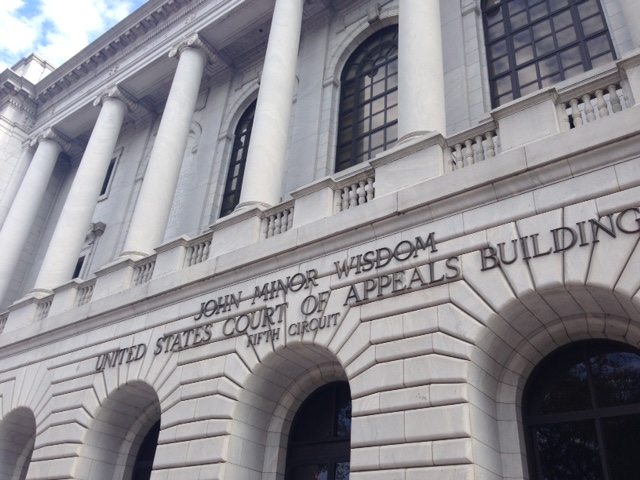Fifth Circuit Judges Take Skeptical View of Same-Sex Marriage Bans
Supporters of same-sex marriage across the South told reporters that they left the Fifth Circuit Court of Appeals feeling optimistic Friday, as counsel for gay and lesbian plaintiffs from Louisiana, Mississippi, and Texas spent the morning in the New Orleans court arguing against same-sex marriage bans in the three states.

Supporters of same-sex marriage across the South told reporters that they left the Fifth Circuit Court of Appeals feeling optimistic Friday, as counsel for gay and lesbian plaintiffs from Louisiana, Mississippi, and Texas spent the morning in the New Orleans court arguing against same-sex marriage bans in the three states.
Lawyers representing the states faced tough, and sometimes even incredulous, questions from panel judges who appeared less than sympathetic to the state attorneys’ claims that same-sex marriage would negatively affect their states’ interest in promoting procreation within heterosexual marriage.
Because of the timing and similarity of the legal issues raised in federal lawsuits in Louisiana, Mississippi, and Texas, a panel of three judges on the Fifth Circuit heard arguments on all three cases on Friday morning. Dozens of members of the public lined up, some as early as 4:30 a.m., to secure seats inside the courtroom for the trial, and many watched the proceedings from an overflow room.
Attorneys for the plaintiffs in all three states made similar arguments—that gay marriage bans violate the 14th Amendment and deny gay and lesbian Americans’ constitutional rights to legal protection under the law—and that there was no rational basis for the states’ respective same-sex marriage bans. They particularly emphasized the effects of the marriage bans on the children of gay and lesbian couples.
“These bans humiliate the children of same-sex couples,” argued Camilla Taylor, representing the plaintiffs in the Louisiana case. “These children are told there is something wrong with them and their families, and the state has no purpose doing that.”
While the plaintiffs focused partly on the laws’ effects on children in gay and lesbian families, the states defending their marriage bans said that the bans were necessary, in part, to protect the states’ interest in encouraging heterosexual couples to marry and procreate, and that procreation through heterosexual sex makes those couples uniquely positioned to receive the governmental benefits associated with marriage.
During arguments in the Mississippi case, a baby’s cry punctuated discussion of heterosexual procreation, and a remark from Judge Patrick Higginbotham that “we don’t need an incentive to have sex”; the baby belonged to a Mississippi gay marriage supporter.
Texas Solicitor General Jonathan Mitchell said that while marriage was partly a celebration of love, he also described it as being akin to a school lunch subsidy that helps low-income children pay for meals, a kind of government-provided “package of benefits” meant to encourage social stability and welfare, giving the state the right to “reserve the subsidy to the group of people who will most likely benefit.”
Judge Graves, an Obama appointee, rejected Mitchell’s argument, saying that in terms of the school lunch comparison, a same-sex marriage ban would be more akin to the state saying some people “can’t eat at all.”
Reagan appointee Judge Higginbotham appeared similarly unmoved by arguments that marriage should be defined in relation to heterosexual procreation, at one point sparring with Mitchell, saying that the state appeared to be arguing that allowing same-sex marriage would somehow discourage straight people from marrying and having children.
“We’re not arguing that at all,” said Mitchell.
“Of course you are!” Higginbotham replied.
Of the three panel members, Judge Jerry Smith, also a Reagan appointee, appeared most amenable to the states’ same-sex marriage bans, focusing on the 42-year-old Supreme Court precedent in Baker v. Nelson, which dismissed the case as a matter for the states, rather than federal court. He also expressed concerns about federal overreach and states’ rights to ban marriage as part of their democratic processes, and appeared persuaded that same-sex marriage bans didn’t have to be a perfect fit for states’ interest in promoting heterosexual procreation within marriage, but could be an “imperfect fit that results in some inequality.”
Smith also remarked that the judges did not necessarily have to agree with the rationalization behind the marriage bans to find them constitutional.
“We don’t have to agree with the rationale to uphold it if we agree there is such a rationale,” he said.
Kyle Duncan, hired as special counsel for the State of Louisiana to defend its marriage ban, called same-sex marriage a “novel social experiment” during his oral arguments in front of the panel, and said that Louisiana was simply being cautious in case same-sex marriage—now legal in 36 states—has as yet unforeseen negative consequences.
Judge Graves asked if the ban, then, was based in fear.
“Since we don’t know, we should fear the unknown so we should ban it?” asked Graves.
Duncan disagreed with Graves’ characterization of the Louisiana law as a “ban.”
Instead, he said, “we’re choosing not to go the way of other states who are engaging in a novel social experiment.”
Countering Duncan’s claims about social experimentation, the plaintiffs’ lawyers variously emphasized the normality and humanity of their clients. Neel Lane, representing the Texas plaintiffs, said that when his clients Cleopatra DeLeon and Nicole Dimetman receive their child’s birth certificate, “Where Cleo’s name should appear? A blank.”
The Fifth Circuit panel could rule on the cases any time in the next several weeks.
